#atelocynus
Explore tagged Tumblr posts
Text

Short-eared Dog | Renata Leite Pitman
105 notes
·
View notes
Text
hey evey one also happy easter it wont be easter on my birthday again until im 78 does any body give a fart also trans visibility day x3 awesomesauce

#my birthday#happy birthday#atelocynus oc#im not like christian or anything i like easter as Spring day with eggs and stuff#that sounds like i got caught by my mom watching gay lps sex videos and i had to come up with an excuse real fast#im not like gay or anything momma i like it as asmr i was only watching to see how long was left momma please dont call the church#easter#happy easter#i came up with this oc on the spot for this i love she sooo millionmuch#no name yet though#furry#feral art#furry art#fursona#oc#oc art#original character art#original character#art#birthday#also my birthday is on#trans day of visibility#AND easter#insane#does sparkledog apply to this design i was gonna give her scene hair but she should be able to be bald i think#sparkledog#using it for my sorting mainly who cares#sparkledog oc#im using x3 as times three but if you wanna see it as a little meow face then go ahead with pride#i got a ton of the new g7 lps today so im joyous
2 notes
·
View notes
Note
Hate to break it to you but the "striped wolf" is literally a hyena. Much like how the "spotted wolf" is an african wild dog. They are meant to represent real non-wolf animals. Bizarre choice, but one they made.
I mean... listen. I wrote and deleted a few posts to try to be as clear as possible.
We got the Grey Wolf and the Dog, right ? Canis lupus and Canis lupus familiaris. Literally same specie. It's clear, it's good.

When we go back to the Genus (grouping everyonr who uses the "Canis" part), we got coyotes, and lots of type of wolves (african wolf, red wolf, golden jackal...). Very clear, those are also wolves (or jackals), it's easy. Let's say those are siblings.
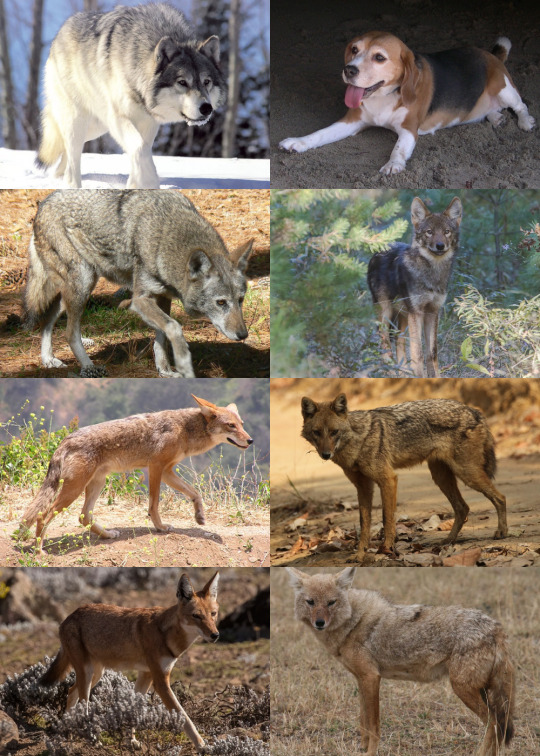
What is their closest relative ? Well usually, the Genuses are grouped in Family, but the "canine-looking" branch is so detailled that there is a sub-family, a tribe and even a sub-tribe, which is pretty rare.
Their sub-tribe is called Canina. In this sub-tribe, there are the Canis(wolves), Lycaon (the only specie is the African Wild Dog), Lupuella (2 species of jackals) and Cuon (the only specie is the dhole). Those are 1rst cousins (their parents were siblings)

Its sister sub-tribe (the other sub-tribe in the tribe Canini) is called Cerdocyonina and has incredible names like Atelocynus, Cerdocyon, Chrysocyon, Lycalopex, and Speothos but the important part is that they are : maned wolf. Bush dogs. South american fox. They're incredibly close to... well, classic grey wolves. They're 2nd cousins (their grandparents were siblings).

Then, the closest relatives of the Canini tribe are the other tribes in the Caninae sub-family. So which other tribes are there ? Well, the tribe Vulpini, which means everything fox ! Red foxes, fennecs, tanuki, all of those are here. They are 3rd degree cousin, meaning their great-grandparent were siblings.

Let's note that, once arrived here, we got already a divergence in models in minecraft. Wolves and Foxes are, clearly, different things in minecraft.
Hyenas are not here. Bc hyenas are so fucking far away.
But to get back to our family tree :
Caninae is a sub family in the family Canidae. The other sub families in it are exict, so in our analogy it just means that their great-great-grandparent didn't have any surviving sibling. So, no 4rth degree cousin.
What is above family ? Order, or in this case, sub-order. The Caniformia sub-order regroups the Canidae family (wolves, dogs, foxes) and the Articoidea family, which are... bears, otters, skunk and walruses. Yeah, all of them. And more, like Red panda and racoons. The scientific terms are Ursoidae, mustelida and pinnipedimorpha. Which means, weasels, polar bears and seals are 5rth cousin with grey wolves and dogs (great great great grandparents were siblings). Also it's really obvious but Bears also have their own minecraft model, distict from wolves are foxes.

Above the Caniformia sub-order, we finally have the Order. Wolves' order are Carnivora, which, are you might guess, is absolutly huge. Sixth lasgest order of mammals. The Carnivora order has 2 sub orders : the caniformia... and the feliformia. THAT'S where the hyena is. The closest relative to both wolves and hyenas are in the ORDER. that's so incredibly far away !!! 6th cousin, so their great great great great grandparent were siblings.

Just. Yeah, imagine, someone comes to you and says "the grandmother of the grandma of your grandma... was the sister of the grand father of the grandma of my grandpa". Do you even consider yourself related, at this point ? Technically yes, but if we consider that all of these people had their kids at 30, and you're 30 yourself that's means the last common ancestor with this person was born in 1780.
Anyway. Yeah. I'm tired. They coded ocelots differently than wild cats but used the same model, and the group where they find eachother is the sub-family (3rd cousin) Hyenas are in a sub-order (5th cousin) with cats. Dogs are more closely related to bears and walruses than to hyenas.
If we transpose that to humans...
Our genus (1rst cousin) is Homo. We're the only surviving specie.Same with our sub tribe, australopithecine.
Our tribe is Hominini. It groups us with chimpanzee and bonobos.
Our subfamily is homininae. It groups us with gorillas.
Our family is hominidae. It groups us with orangutans.
We have a super-family grouping us with gibbons and siamang. A parv-order grouping us with macaques, baboons, madrills. A infraorder grouping us with spider monkeys, marmosets, squirel monkeys.
Suborder harplohini groups us with tarsiers.
Our order, Primates, groups us with lemurs. Lorises. Pottos. Galagos.
You are closer to this



...than a dog is close to a hyena.
So no, I refute Mojang's choice. Their "stiped wolf" will not be a hyena. They made up creepers and sniffers and endermites, well they also made up the striped wolf. Their 'wolves' can be coyotes and jackals and weirder things, but since they can't be foxes or bears... they can't be hyenas.
#minecraft#minecraft dog#minecraft wolf#i know they decided to go with “but they kinda look like wolves' but like. they're still not wolves.#do thet laugh and cry like hyenas or do they go 'woof woof' ? yeah that's a proof too#biology
23 notes
·
View notes
Text


#my polls#tumblr polls#polls#animal polls#poll blog#animals#canine#canidae#short-eared dog#south american wildlife
32 notes
·
View notes
Note




Short-eared dog
Short-eared zorro
Small-eared dog
Atelocynus microtis
Atelocynus, caninae, canidae, caniforma
Females are 1/3 bigger than the males, these guys are solitary, and they live in the amazon

HOL Bro HEs so doggy… like. If you distilled the essence of dog… that’s him. Smooth doggy
9 notes
·
View notes
Text
Short-eared dog (Atelocynus Microtis)

By Igor de le Vingne - Own work, CC BY-SA 4.0, Link
Sometimes also called the short-eared zorro this beast native to the Amazon is the only species in it's genus. Fish make up almost a third of it's diet (unsurprising considering it's closest relative the crab-eating fox) with insects being a close second.
Some indigenous names include nomensarixi (Chiquitano), uálaca (Yucuna) and achuj (Ninam & Mosetén).
0 notes
Text

Anjing telinga-pendek (Atelocynus microtis), atau yang juga dikenal sebagai zorro telinga-pendek atau anjing telinga-kecil[3] adalah sebuah spesies canid khas dan sukar yang endemik ke Cekungan Amazon. Spesies ini menjadi satu-satunya dalam genus Atelocynus.
0 notes
Text
The Ghost Dogs of the Amazon
Scientists have produced data that shows the range of an enigmatic short-eared canid species that has yet to be widely studied. It is one of the Amazon rain forest’s most elusive and enigmatic mammals. Experts call the species “shy” or even “a ghost.”
It’s a dog or at least a type of dog. The short-eared dog is the only member of the canine genus Atelocynus, and the only such species unique to the Amazon rainforest. In a study published last month in Royal Society Open Science, 50 researchers chipped away at the creature’s mysteries by putting together a large location data set gleaned mostly from camera trap cameos. By mapping the species’s range and determining its preferred habitat, the scientists, many of whom have never encountered the animal in person, hope to help protect it.
Daniel Rocha, a graduate student at the University of California, Davis, and the study’s lead author, became interested in the short-eared dog in 2015, when he began working in the southern part of the Amazon. He and his colleagues set up camera traps to study the local mammal community. As they looked through the footage, “these dogs would appear,” he said. With pricked ears and furrowed brows, they almost look surprised to be caught on camera. It surprised him, too. Even locals who spend a lot of time in the Amazon don’t often see short-eared dogs, which were assumed to be quite rare. They also evade career researchers focused on this region: Mr. Rocha, who spent years leading this study, said, “I’ve never seen the dog in the jungle, ever.”
Carlos Peres, an ecology professor at the University of East Anglia who contributed to the study, has been working in the Amazon for nearly 40 years. His longest sighting of a short-eared dog lasted about 20 seconds as it chased a spiny rat into a hollow log. They’re incredibly secretive,” he said.
Many canid species, from wolves to African wild dogs, hunt in packs and prefer more open habitats, like tundra or grasslands. Short-eared dogs, which only live in the Amazon, are mostly solitary and “almost certainly the most rainforest-adapted of all the canids,” said Dr. Peres. They are most comfortable trotting around in the trees, far from anywhere people might tread.
As a result, the species is “one of the least studied dogs worldwide,” Mr. Rocha said. We don’t know much about their life histories or reproductive strategies, or how many of them exist. We don’t even really know what they eat, although scat studies suggest that they like fish, small mammals and fruit.
Individual experts have gone to great lengths to change that. Renata Leite Pitman, a contributor to the study and an affiliated scholar at Duke University’s Nicholas School of Environment, once obtained a short-eared dog pup that had been raised with domestic dogs. She and her assistant, Emeterio Nuñonca Sencia, trained the dog to walk on a leash and took careful notes on what he sniffed at, ate and avoided. She has also managed to track several dogs with radio collars.










0 notes
Text
Species: South American Canids (Speothos, Chrysocyon, Lycalopex, Cerdocyon, Atelocynus)
This series focuses on helping people choose interesting species for their fursona through informing them of the many, often overlooked, species out there! This post is about South American canids, including false foxes.
──── ◉ ────
Bush Dog (Speothos venaticus)

The bush dog has 3 subspecies:
South American Bush Dog (Speothos venaticus venaticus)
Panamian Bush Dog (Speothos venaticus panamensis)
Southern Bush Dog (Speothos venaticus wingei)
It is oddly hard to find pics of the different subspecies, sorry
Size: 20-30cm (8-12in) height (at shoulder), 57-75cm (22-30in) lenght, 12-15cm (5-6in) tail lenght, 5-8kg (11-18lbs) weight
Diet: carnivorous, preys on large rodents
Habitat: lowland forests, wet savannahs, open pastures
Range:
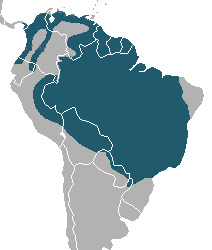
Status: near threatened
──── ◉ ────
Maned Wolf (Chrysocyon brachyurus)

Size: 90cm (35in) height (at shoulder), 100cm (39in) lenght, 45cm (18in) tail lenght, 23kg (51lbs) weight
Diet: omnivorous, preys on small/medium mammals, birds, fish; eats fruit, tubers, sugarcane, other plants
Habitat: savannahs
Range:
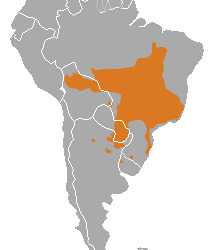
Status: near threatened
──── ◉ ────
Hoary Fox (Lycalopex vetulus)

Size: 58-72cm (23-28in) lenght, 25-36cm (9-14in) tail lenght, 3-4kg (6-8lbs) weight
Diet: omnivorous, preys on invertebrates, rodents, birds; eats fruit
Habitat: woodlands, bushlands, savannahs
Range:

Status: near threatened
──── ◉ ────
Sechuran Fox (Lycalopex sechurae)

Size: 50-78cm (20-31in) lenght, 27-34cm (11-13in) tail lenght, 2.6-4.2kg (5.7-9.3lbs) weight
Diet: omnivorous, varied. Preys on invertebrates, rodents; eats carrion, fruit, seed pods
Habitat: deserts, dry forests, beaches
Range:
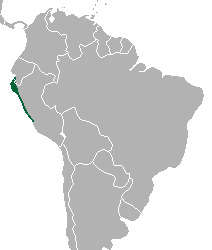
Status: near threatened
──── ◉ ────
Darwin's Fox (Lycalopex fulvipes)
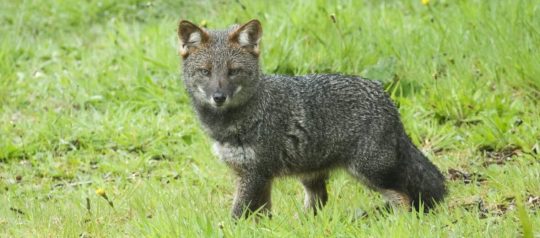
Size: 48-59cm (19-23in) lenght, 17-25cm (7-10in) tail lenght, 1.8-3.9kg (4-8.7lbs) weight
Diet: omnivorous, preys on invertebrates, small mammals, reptiles; eats fruit
Habitat: southern temperate rainforests
Range:
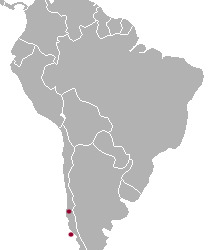
Status: endangered
──── ◉ ────
Pampas Fox (Lycalopex gymnocercus)

Size: 51-80cm (20-31in) lenght, 2.4-8kg (5.3-17.6lbs) weight
Diet: omnivorous, preys on birds, small mammals, invertebrates; eats carrion, fruit
Habitat: montane forests, dry scrublands, wetlands
Range:

Status: least concern
Please note! The pampas fox has 3 subspecies!
──── ◉ ────
South American Grey Fox (Lycalopex griseus)

Size: 65-110cm (26-43in) lenght including 20-43cm (8-17in) tail lenght, 2.5-5.4kg (5.5-12lbs) weight
Diet: omnivorous, preys on small mammals, birds, reptiles, invertebrates; eats carrion, fruit
Habitat: varied; scrublands, steppes, forests
Range:

Status: least concern
──── ◉ ────
Culpeo (Lycalopex culpaeus)

Size: 95-132cm (37-52in) lenght including 32-44cm (13-17in) tail lenght, 5-13.5kg (11-30lbs) weight
Diet: carnivorous, preys on lagomorphs, small mammals
Habitat: varied; temperate rainforests, forests, scrublands, deserts
Range:

Status: least concern
Please note! The culpeo has 5 subspecies!
──── ◉ ────
Crab-Eating Fox (Cerdocyon thous)
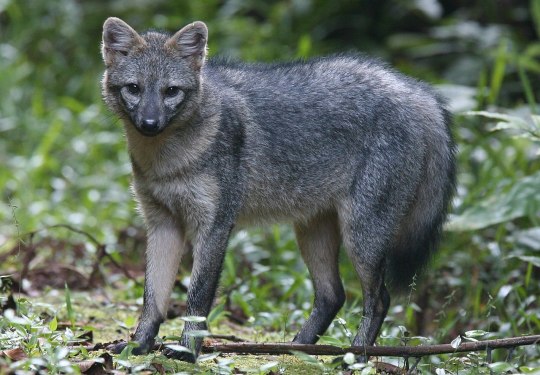
Size: 64cm (25in) lenght, 28cm (11in) tail lenght, 4.5-7.7kg (10-17lbs) weight
Diet: omnivorous, preys on crabs, small mammals, birds, crustaceans, invertebrates, reptiles; eats carrion, fruit
Habitat: savannahs, woodlands, subtropical forests, shrublands
Range:

Status: least concern
Please note! The crab-eating fox has 5 subspecies!
──── ◉ ────
Short-Eared Dog (Atelocynus microtis)
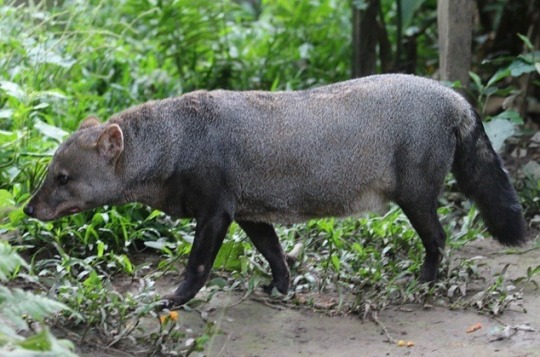
Size: 72-100cm (28-39in) lenght, 9-10kg (19-22lbs) weight
Diet: mostly carnivorous, preys on fish, invertebrates, small mammals, birds; eats fruit
Habitat: rainforests, lowland forests, swamp forests, cloud forests
Range:
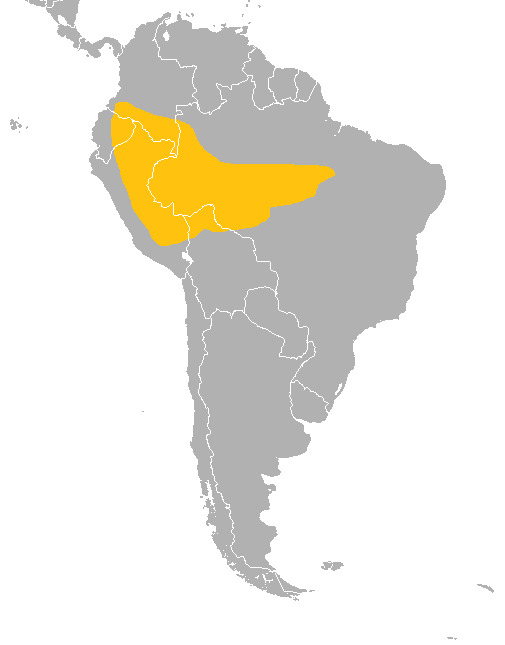
Status: near threatened
Please note! The short-eared dog has 2 subspecies!
──── ◉ ────
#fursona resources#furry#fursona#species#canidae#canine#speothos#chrysocyon#lycalopex#cerdocyon#atelocynus#bush dog#maned wolf#fox#foxes#false foxes#hoary fox#sechuran fox#darwin's fox#pampas fox#south american grey fox#culpeo#crab-eating fox#short-eared dog
7 notes
·
View notes
Text

Short-eared Dog | Galo Zapata Ríos
13 notes
·
View notes
Text
i like using those probably-ai-generated songs on spotify for background noise in my zoology posts on platforms that allow music. bonus points if they have the animal's common name in the title since they likely just pull a couple random words from the dictionary and work with it, i'm not sure how it works but finding out Affenpinscher Frump by The Work Smith was likely never touched by a real person before me was HEARTBREAKING. i imagined it was about some old alluring lady who loved affenpinschers and was probably lesbian and and
#ramblepaws#it's so sad to love extremely unknown animals because you like wolves? you have HUNDREDS of songs actually about them but#but you like something like atelocynus microtis? greater gibbon? AFFENPINSCHER?#you take your ass to spotify and listen to your shitty ai instrumental tracks and dream of a better future that's what you do#i dont know if theyre somehow making them ethically like if they have a real system likely not but i hope so
0 notes
Link

#ghost dogs#mysterious creatures#canid#Peruvian Amazon#amazon#peru#Atelocynus#the Amazon rainforest’s “ghost dog”#short-eared dog#Atelocynus microtis#short-eared dogs (Atelocynus microtis) are the only members of their own genus#elusive canids
19 notes
·
View notes
Photo

Atelocynus microtis - Short-Eared Dog
#short-eared dog#atelocynus#microtis#canidae#carnivora#mammalia#chordata#animalia#near threatened#south america#amazon river basin#rain forest#terrestrial#faunal frontier#the faunal frontier
33 notes
·
View notes
Text
Atelocynus microtis
This odd-looking canine is called a short-eared dog. They are so elusive, though, that they are often called “ghost dogs.” Sightings of them are very rare, which makes research on them difficult.

There’s been a lot of confusion over what the short-eared dog is. It used to be in the lycalopex genus with the zorros and the cerdocyon genus with the crab-eating fox, who it resembles, but now it’s in its own genus- atelocynus.
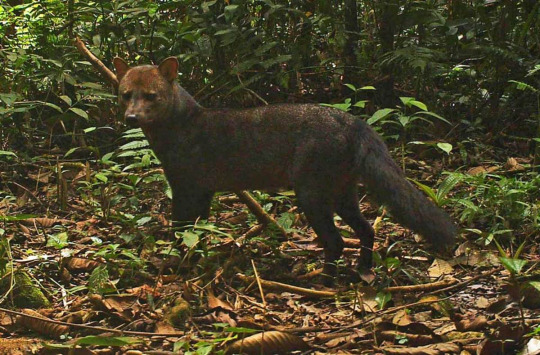
Short-eared dogs live in the Amazon rainforest in Peru, Columbia, Ecuador, Bolivia, and Brazil. They try to live far away from people, making them highly susceptible to habitat loss. Because of this it is suspected that their population is decreasing, but because sightings of them have always been rare it’s hard to estimate how many are left.
Studies of short-eared dog scat suggests that they eat lots of fruit, rodents, and fish. The fish in their diets along with their partially webbed feet could mean that short-eared dogs spend a lot of time in water, similar to the bush dog.
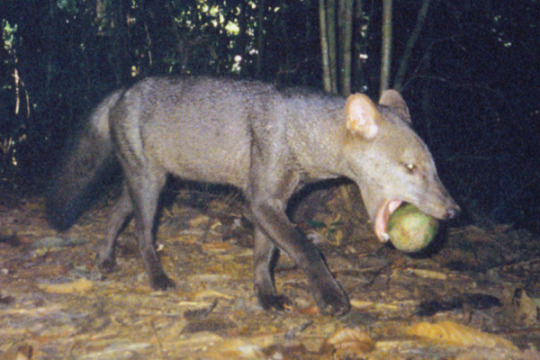
Much of what is known about these elusive animals comes from one short-eared dog named Oso, who was found when he was a puppy by a logger. He was then raised with pet dogs until a wildlife veterinarian named Renata Leite Pitman took over his care. By observing how Oso found food and interacted with other animals, Pitman learned about parts of the short-eared dogs’ life that scientists previously knew almost nothing about.
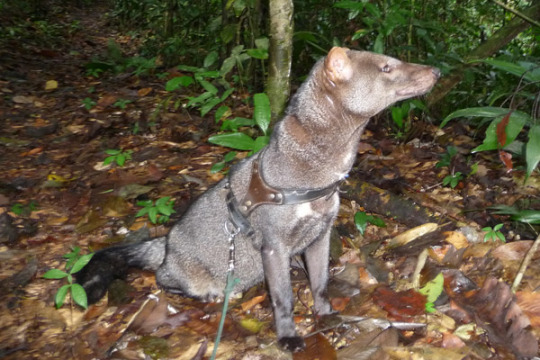
Before Pitman’s work with Oso, virtually nothing was known about short-eared dog vocalization, or the sounds they make. The veterinarian observed that Oso was very quiet but whined or “roared” when he was uncomfortable, and he occasionally made an unusual call that was “similar to some species of owl calls.”
When Oso was around 4 years old he was released into the wild with a tracker, allowing researchers to continue to learn about short-eared dogs.
I rate these very mysterious ghost dogs 13/10. They have a very distinctive look.
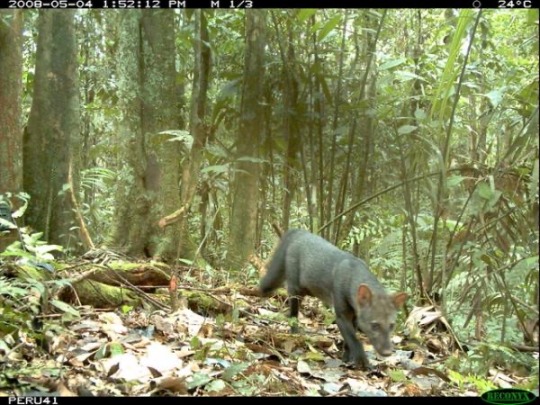
Photo credits:
(1) Galo Zapata-Rios (2) Owlcation (3) Renata Leite Pitman (4) Renata Leite Pitman (5) eMammal
#short eared dog#animal#animals#nature#wildlife#canine#wild animals#world#canid#dog#South America#South American animals#short-eared dog#canines#long post sorry
2K notes
·
View notes
Text
Atelocynus microtis
This odd-looking canine is called a short-eared dog. They are so elusive, though, that they are often called “ghost dogs.” Sightings of them are very rare, which makes research on them difficult.
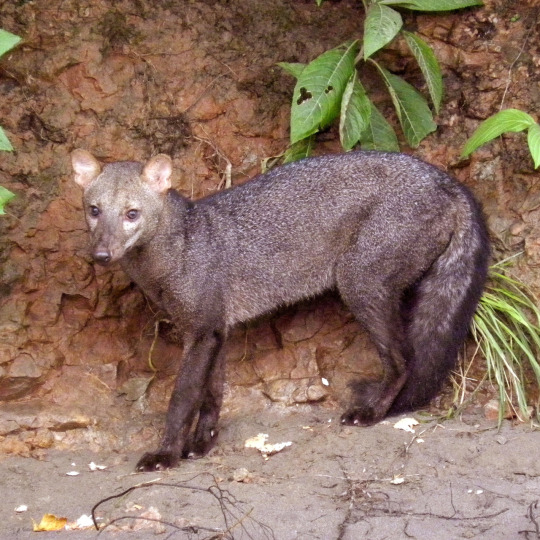
There’s been a lot of confusion over what the short-eared dog is. It used to be in the lycalopex genus with the zorros and the cerdocyon genus with the crab-eating fox, but now it’s in its own genus- atelocynus.
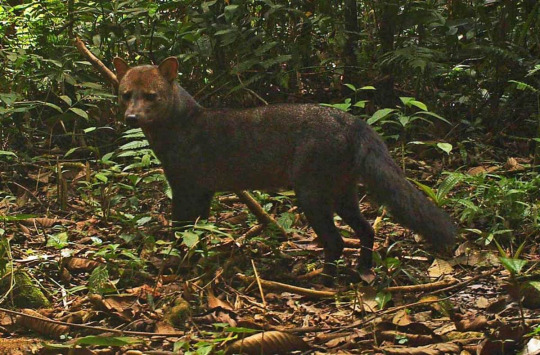
Short-eared dogs live in the Amazon rainforest in Peru, Columbia, Ecuador, Bolivia, and Brazil. They try to live far away from people, making them highly susceptible to habitat loss. Because of this it is suspected that their population is decreasing, but because sightings of them have always been rare it’s hard to estimate how many are left.
Studies of short-eared dog scat suggests that they eat lots of fruit, rodents, and fish. The fish in their diets along with their partially webbed feet could mean that short-eared dogs spend a lot of time in water, similar to the bush dog.
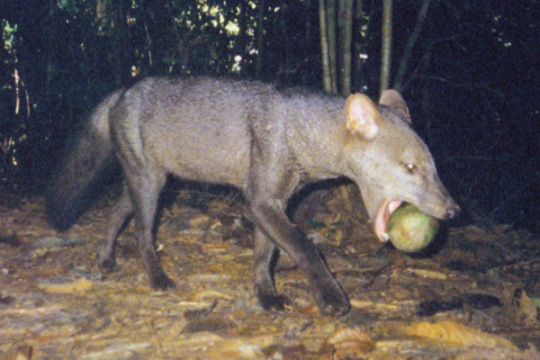
Much of what is known about these elusive animals comes from one short-eared dog named Oso, who was found when he was a puppy by a logger. He was then raised with pet dogs until a wildlife veterinarian named Renata Leite Pitman took over his care. By observing how Oso found food and interacted with other animals, Pitman learned about parts of the short-eared dogs’ life that scientists previously knew almost nothing about.
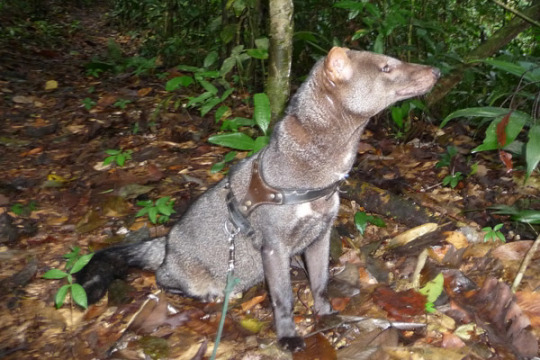
Before Pitman’s work with Oso, virtually nothing was known about short-eared dog vocalization, or the sounds they make. The veterinarian observed that Oso was very quiet but whined or “roared” when he was uncomfortable, and he occasionally made an unusual call that was “similar to some species of owl calls.”
When Oso was around 4 years old he was released into the wild with a tracker, allowing researchers to continue to learn about short-eared dogs.
I rate these very mysterious ghost dogs 13/10. They have a very distinctive look.
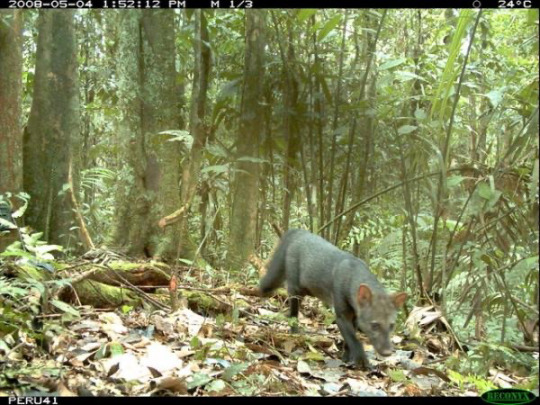
Photo credits:
(1) Galo Zapata-Rios (2) Owlcation (3) Renata Leite Pitman (4) Renata Leite Pitman (5) eMammal
#short eared dog#animals#biology#nature#science#wildlife#zoology#animal#dog#dogs#wild#canines#ghost dog#South American animals#South America#rainforest
2K notes
·
View notes
Photo

Short-eared dog, Atelocynus microtis by muir
#art#dark art#photography#cryptid#animals#canid#short eared dog#trail cam#OK#this is actually just a photo from inaturalist#BUT???#spooky
285 notes
·
View notes